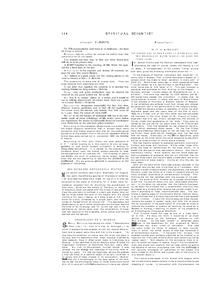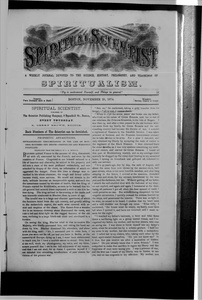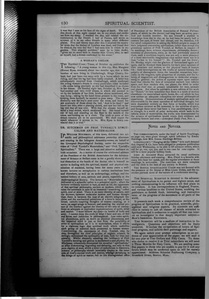< Dr. Hitchman on Prof. Tindall's Spiritualism and Materialism (continued from page 3-82) >
of President of the British Association of Natural Philosophers, of which he (the doctor) had long been an active, practical and humble member. He was himself a student n knowledge from day to day, as he had been for nearly half a century last past, at home and abroad, and he, therefore, felt but small compunction in asking the British people to suspend their judgment concerning spiritualism, rather than accept the gratuitous opinion of Prof. Tyndall, at Belfast, in respect of its teachings, facts, science, experiments, philosophy, demonstrations or phenomena, since, as he had previously assured them, such a worthless inquiry was not only a mere phantasy of a most unscientific imagination—but neither more nor less than “a bee in his bonnet”! Dr. Tyndall and his friend. Dr. Huxley, might visit the glaciers of Switzerland again and again, and he thanked them heartily for their joint opinions of their structure and motion, or the physical basis of human life; their investigations on the truths of natural history, the polarity of diamagnetic force, the beautiful researches, especially on the magnets, optic properties of crystals, and the relation of magnetism and diamagnetism to molecular arrange men, in general; the action of aqueous vapor upon radiant heat, that checks the flow of terrestrial warmth into infinite space, and thus renders this, our planet, the third in order from the chief star, at present inhabitable for men, animals and plants. But when he publishes a new edition of his work on “Sound,” let him remember that there is a mode of motion elsewhere—in materialized spirit, forms, &c.—of which he has now neither an adequate conception nor sound philosophical experience. Demonstrations of modern spiritualism were not discoverable by the mere operation of individual thought, but were dependent entirely on that force or faculty, which was everywhere existent as life immortal, in the universe of spirit, and though there never had been a true parallelogram, circle or triangle, in a world of polar molecules, which ends in the infinite azure of materialism, the truths now demonstrated by the science of spiritualism would retain their evidence and certainty forever and ever.—Liverpool Daily Post, Nov. 2.
<Untitled> (Belief is not the subject of individual will)
Belief is not the subject of individual will, but is the inevitable result of those unfoldings of life which come before our cognizance, for reason as inexorable forms its conclusions from these data as the new-born infant breathes.
According to the precession of equinoxes it is evident that the Easter religious ceremonial had in ancient days some connection with Easter science, and that all the observances carried on at the present time in the church represent what in former days were carried out in connection with the worship of Nature.
According to Prof. John Fiske, the slow alteration of physique which is going on in this country is only an exaggeration of that which modern civilization is tending to bring about everywhere. It is caused by the premature and excessive strain upon the mental powers requisite to meet the emergencies of our complex life. The progress of events has thrown the work of sustaining life so largely upon the brain that we are beginning to sacrifice the physical to the intellectual. We are growing spirituel in appearance at the expense of robustness.
Prophetic Apparitions
Blucher quitted France in the autumn of 1815, discontent ed with ail, execrated by the French, and even by the enemies of France. Chagrined to see himself reduced to a life of inaction and obscurity, he retired to his property and fell into a state of the most profound melancholy, and was attacked by dropsy of the chest, an incarnation of which exaggerated the danger. From this time a change was remarked in his whole character, the rough and brutal soldier became timid, even nervous. He would not remain in the dark, solitude became an inexpressible agony, and such was the uneasiness caused by his state of health, that the King of Prussia started for Krieblowitz, as soon as he learned that his old general had several times expressed a wish to see him before dying. The king arrived in the evening at the castle, and was instantly conducted to Blucher, then 74 years of age.
The invalid was in a large and obscure apartment, of which the furniture dated from the 15th century, and greatly adding to the melancholy aspect, the walls were covered with armor and trophies of the chase. The flames from a wooden fire in an immense chimney alone illuminated the room, and cast a red and fitful light on the rugged features of the old man, reclining in a large black-oak chair and enveloped in a furskin.
On seeing the king, Blucher tried to rise to receive His Majesty, who kindly prevented him, and taking his hand sat down by him. Blucher dismissed his attendant, and alone with the king, said: “Sir, I entreated you to come here, I knew you were not far off, yet had you been in Berlin, or the extremity of Europe, dying as I am, I must have endeavored to reach you, for I have a terrible secret to reveal. Sire, look at me well, mark my physiognomy, my voice, and my ideas, assure yourself that I am in the full enjoyment of my reason, and that 1 am not mad, for at times I question myself if I am deluded into mistaking recollections of past events for visions of the present war.
“But, no,” he exclaimed, taking a gold bracelet from his breast.—“all is real, J cannot doubt
“When in 1756 the seven years’ war broke out, my hither, who lived on his estate of Cross Rensow, sent me to one of our relations, the Princess Kraswisk, in the Isle of Rugen. I was then 14, and after a time passed in the old fortress without news from my family, for Gross Rensow and the surrounding country had become the theatre of war. I entered a regiment of Hussars in the Swedish Service. I was taken prisoner at Suokow, and the Prussian Government pressed me to take service in its army. For a year I resisted, and only obtained my liberty by accepting the rank of cornet in the regiment of the Black Hussars. I then obtained leave for some months, as I was very anxious concerning my moth-er and sisters, and started for Gross Rensow. I found all this part of Mecklenburg wasted, and as my carriage could scarcely be dragged up the steep road leading to my ancestral home, I sprang on horseback and galloped off, followed by only one servant.
“It is 59 years ago, day by day, the 20th of August, and about the same hour now shown by the ancient clock, half-past eleven, when in die most horrible weather, and after long straying in the forest, I arrived at the mansion, drenched with rain and alone, for my servant, bewildered by the tempest and the darkness, lost me. Without getting off my horse, I struck the nail-studded door with the butt-end of my whip; no one replied, and again and again I hammered at the door; losing all patience I got off; when the door opened of itself. I could perceive no one. But without being disquieted by that singular occurrence, I quickly crossed the avenue, burned up the steps, and penetrated the interior. There was no light to be seen, no sound to be heard. I confess that my heart sank and a cold shudder ran through my veins. ‘What folly,’ I exclaimed, ‘the house must be empty, my family must have left when I quitted it, and hast not returned: still I must remain for the night.’
“I reached my father’s bedroom, a faint and fitful flame threw a vacillating light on a group seated round, and I recognized my father, my mother, and my four sisters, who rose on seeing me. I was about to throw myself into my father’s arms, when he arrested me by a solemn gesture. I held out my arms to my mother, but she retreated with a melancholy air. I called out to my sisters, who, taking each other by the hand, again seated themselves. ‘Do you not know me? Is it thus that you receive me after a separation of sixteen years? Do you already know that I serve Prussia? I was compelled to make that sacrifice to regain my liberty and the happiness of once more seeing you. I was a prisoner of war, and the first use I made of my liberty was to hasten to see you, and no one responds to my affection. My mother, you <... continues on page 3-84 >
A Woman`s Dream
TheHartford (Conn) Times, of October 29, publishes the following: “A young woman in this city, Mrs. Margaret (Horan) Ryan, dreamed, about two months ago, that a little brother of hers living in Clonfanlough, Kings County, Ireland, had just been run away with by a horse which he was riding, and that his leg had been badly crushed. A letter was subsequently received from Clonfanlough, which confirmed the young woman’s dream in every particular—time included —the scene being precisely as she had described it as shown in her dream. On Sunday night last, October 25, Mrs. Ryan had another and very vivid dream, in which she seemed to sit by the bedside of her little brother above mentioned, who was dying; taking by the hand those present in the room, and bidding them farewell, he seemed to pass away. The sleeper distinctly saw the boy’s aunt enter the room, and heard her ask anxiously of those about the bed, ‘And is he dead?’ and heard her then utter a piercing shriek, and saw her fall on being told that all was over. With that the sleeper herself uttered a loud shriek, which awakened her. She found herself out of bed, and standing on the floor in the middle of the room, and holding on to a chair. The truth or error of this dream remains yet to be ascertained. We shall report the result whatever it proves to be. Mrs. Ryan is firmly convinced that it is true.”
<Untitled> (In the laws that regulate)
In the laws that regulate the universe it is decreed that nothing wicked can long endure.—Bulwer.
Great men and great institutions may be beyond the most of us, but great actions are for us all.
All that is in motion refers to a mover, and it would he bat an infinite adjournment of causes were there not a great Immovable Mover.—Aristotle.
Editor's notes
- ↑ Belief is not the subject of individual will by unknown author, Spiritual Scientist, v. 1, No. 11, November 19, 1874, p. 128
- ↑ Prophetic Apparitions by unknown author, Spiritual Scientist, v. 1, No. 12, November 26, 1874, pp. 133-4
- ↑ A Woman`s Dream by unknown author, Spiritual Scientist, v. 1, No. 11, November 19, 1874, p. 130
- ↑ In the laws that regulate by unknown author, Spiritual Scientist, v. 1, No. 11, November 19, 1874, p. 128
Sources
-
Spiritual Scientist, v. 1, No. 11, November 19, 1874, p. 128
-
Spiritual Scientist, v. 1, No. 12, November 26, 1874, pp. 133-4
-
Spiritual Scientist, v. 1, No. 11, November 19, 1874, p. 130




